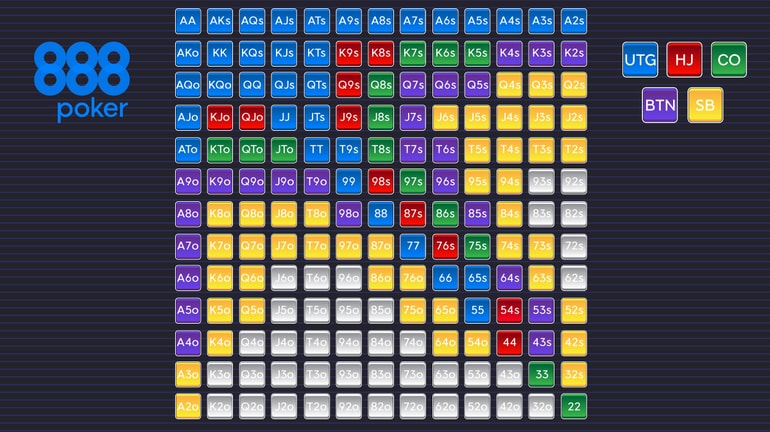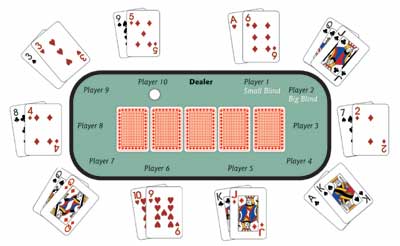Poker is any of a number of card games in which players wager over which hand is best according to that specific game's rules in ways similar to these rankings.Often using a standard deck, poker games vary in deck configuration, the number of cards in play, the number dealt face up or face down, and the number shared by all players, but all have rules that involve one or more rounds of betting. Any card that is the odd one out is hurting your hand. It's called a dangler. For example, if you have three strong cards and a 7, the 7 is a dangler. Hands that have a dangler should generally be avoided. Starting hands that have three-of-a-kind are actually no good in Omaha since you can only use two of your cards.
How To Look At Your Cards In Poker
In the poker game of Texas hold 'em, a starting hand consists of two hole cards, which belong solely to the player and remain hidden from the other players. Five community cards are also dealt into play. Betting begins before any of the community cards are exposed, and continues throughout the hand. The player's 'playing hand', which will be compared against that of each competing player, is the best 5-card poker hand available from his two hole cards and the five community cards. Unless otherwise specified, here the term hand applies to the player's two hole cards, or starting hand.

Essentials[edit]
There are 1326 distinct possible combinations of two hole cards from a standard 52-card deck in hold 'em, but since suits have no relative value in this poker variant, many of these hands are identical in value before the flop. For example, A♥J♥ and A♠J♠ are identical in value, because each is a hand consisting of an ace and a jack of the same suit.
Therefore, there are 169 non-equivalent starting hands in hold 'em, which is the sum total of : 13 pocket pairs, 13 × 12 / 2 = 78 suited hands and 78 unsuited hands (13 + 78 + 78 = 169).
This is a discussion on What is a good starting bankroll? Within the online poker forums, in the Learning Poker section; Hello, I was usually depositing about 20-30 USD just to make it to about. The 10 Best Starting Hands in Texas Hold 'em Poker. Nick Koudis / Photodisc / Getty Images. A pair of aces, also known as 'pocket rockets' (and sometimes 'American Airlines') is the best. Ace-King (Suited) Ace-Queen (Suited). Guesstimate the risks on your starting hand. Look at your cards to see what you’re holding. Check for a pair, 2 consecutive numbers, cards that are from the same house, or face cards, which may be good cards. Then, decide if it’s worth placing a bet to see what the community cards will be.
These 169 hands are not equally likely. Hold 'em hands are sometimes classified as having one of three 'shapes':
- Pairs, (or 'pocket pairs'), which consist of two cards of the same rank (e.g. 9♠9♣). One hand in 17 will be a pair, each occurring with individual probability 1/221 (P(pair) = 3/51 = 1/17).
- Alternative means of making this calculation
- First Step
- As confirmed above.
Good Starting Cards In Poker Real Money
- There are 1326 possible combination of opening hand.
- Second Step
- There are 6 different combos of each pair. 9h9c, 9h9s, 9h9d, 9c9s, 9c9d, 9d9s. Therefore, there are 78 possible combinations of pocket pairs (6 multiplied by 13 i.e. 22-AA)
- To calculate the odds of being dealt a pair
- 78 (the number of any particular pair being dealt. As above) divided by 1326 (possible opening hands)
- 78/1326 = 0.058 or 5.8%
- Suited hands, which contain two cards of the same suit (e.g. A♣6♣). 23.5% of all starting hands are suited.
Probability of first card is 1.0 (any of the 52 cards)Probability of second hand suit matching the first:There are 13 cards per suit, and one is in your hand leaving 12 remaining of the 51 cards remaining in the deck. 12/51=.2353 or 23.5%
- Offsuit hands, which contain two cards of a different suit and rank (e.g. K♠J♥). 70.6% of all hands are offsuit hands

Offsuit pairs = 78Other offsuit hands = 936
It is typical to abbreviate suited hands in hold 'em by affixing an 's' to the hand, as well as to abbreviate non-suited hands with an 'o' (for offsuit). That is,
- QQ represents any pair of queens,
- KQ represents any king and queen,
- AKo represents any ace and king of different suits, and
- JTs represents any jack and ten of the same suit.
Limit hand rankings[edit]
Some notable theorists and players have created systems to rank the value of starting hands in limit Texas hold'em. These rankings do not apply to no limit play.
Sklansky hand groups[edit]
David Sklansky and Mason Malmuth[1] assigned in 1999 each hand to a group, and proposed all hands in the group could normally be played similarly. Stronger starting hands are identified by a lower number. Hands without a number are the weakest starting hands. As a general rule, books on Texas hold'em present hand strengths starting with the assumption of a nine or ten person table. The table below illustrates the concept:
Chen formula[edit]
The 'Chen Formula' is a way to compute the 'power ratings' of starting hands that was originally developed by Bill Chen.[2]

- Highest Card
- Based on the highest card, assign points as follows:
- Ace = 10 points, K = 8 points, Q = 7 points, J = 6 points.
- 10 through 2, half of face value (10 = 5 points, 9 = 4.5 points, etc.)
- Pairs
- For pairs, multiply the points by 2 (AA=20, KK=16, etc.), with a minimum of 5 points for any pair. 55 is given an extra point (i.e., 6).
- Suited
- Add 2 points for suited cards.
- Closeness
- Subtract 1 point for 1 gappers (AQ, J9)
- 2 points for 2 gappers (J8, AJ).
- 4 points for 3 gappers (J7, 73).
- 5 points for larger gappers, including A2 A3 A4
- Add an extra point if connected or 1-gap and your highest card is lower than Q (since you then can make all higher straights)
Phil Hellmuth's: 'Play Poker Like the Pros'[edit]
Phil Hellmuth's 'Play Poker Like the Pros' book published in 2003.
| Tier | Hands | Category |
|---|---|---|
| 1 | AA, KK, AKs, QQ, AK | Top 12 Hands |
| 2 | JJ, TT, 99 | |
| 3 | 88, 77, AQs, AQ | |
| 4 | 66, 55, 44, 33, 22, AJs, ATs, A9s, A8s | Majority Play Hands |
| 5 | A7s, A6s, A5s, A4s, A3s, A2s, KQs, KQ | |
| 6 | QJs, JTs, T9s, 98s, 87s, 76s, 65s | Suited Connectors |
Statistics based on real online play[edit]
Statistics based on real play with their associated actual value in real bets.[3]
| Tier | Hands | Expected Value |
|---|---|---|
| 1 | AA, KK, QQ, JJ, AKs | 2.32 - 0.78 |
| 2 | AQs, TT, AK, AJs, KQs, 99 | 0.59 - 0.38 |
| 3 | ATs, AQ, KJs, 88, KTs, QJs | 0.32 - 0.20 |
| 4 | A9s, AJ, QTs, KQ, 77, JTs | 0.19 - 0.15 |
| 5 | A8s, K9s, AT, A5s, A7s | 0.10 - 0.08 |
| 6 | KJ, 66, T9s, A4s, Q9s | 0.08 - 0.05 |
| 7 | J9s, QJ, A6s, 55, A3s, K8s, KT | 0.04 - 0.01 |
| 8 | 98s, T8s, K7s, A2s | 0.00 |
| 9 | 87s, QT, Q8s, 44, A9, J8s, 76s, JT | (-) 0.02 - 0.03 |
Nicknames for starting hands[edit]
In poker communities, it is common for hole cards to be given nicknames. While most combinations have a nickname, stronger handed nicknames are generally more recognized, the most notable probably being the 'Big Slick' - Ace and King of the same suit, although an Ace-King of any suit combination is less occasionally referred to as an Anna Kournikova, derived from the initials AK and because it 'looks really good but rarely wins.'[4][5] Hands can be named according to their shapes (e.g., paired aces look like 'rockets', paired jacks look like 'fish hooks'); a historic event (e.g., A's and 8's - dead man's hand, representing the hand held by Wild Bill Hickok when he was fatally shot in the back by Jack McCall in 1876); many other reasons like animal names, alliteration and rhyming are also used in nicknames.
Notes[edit]
Best Starting Cards In Poker
- ^David Sklansky and Mason Malmuth (1999). Hold 'em Poker for Advanced Players. Two Plus Two Publications. ISBN1-880685-22-1
- ^Hold'em Excellence: From Beginner to Winner by Lou Krieger, Chapter 5, pages 39 - 43, Second Edition
- ^http://www.pokerroom.com/poker/poker-school/ev-stats/total-stats-by-card/[dead link]
- ^Aspden, Peter (2007-05-19). 'FT Weekend Magazine - Non-fiction: Stakes and chips Las Vegas and the internet have helped poker become the biggest game in town'. Financial Times. Retrieved 2010-01-10.
- ^Martain, Tim (2007-07-15). 'A little luck helps out'. Sunday Tasmanian. Retrieved 2010-01-10.